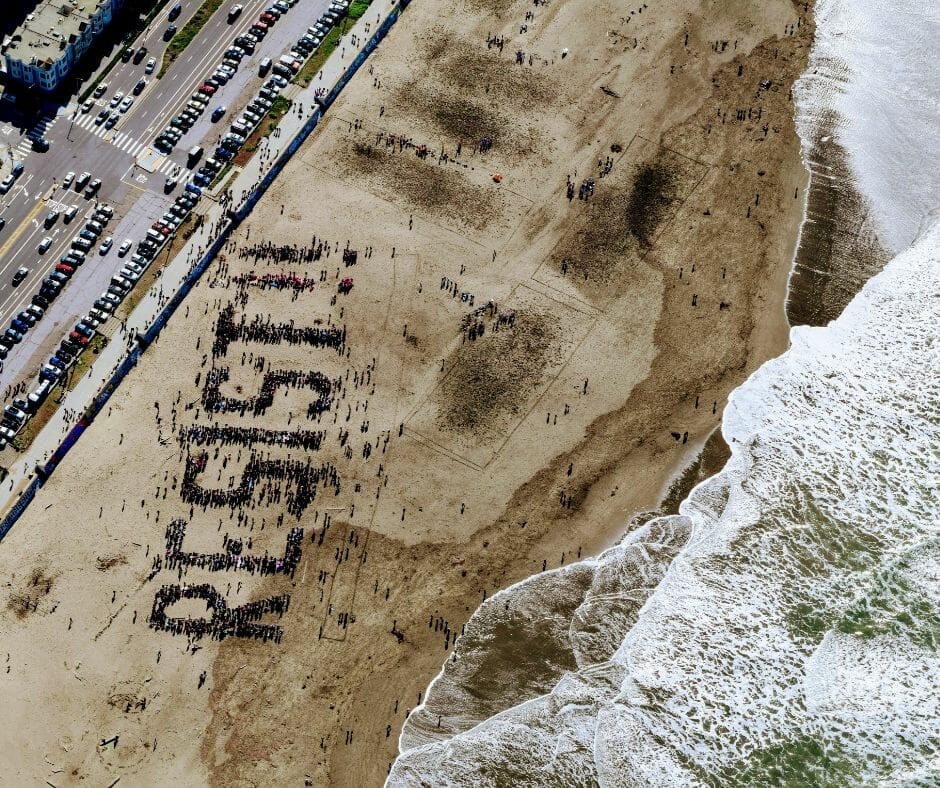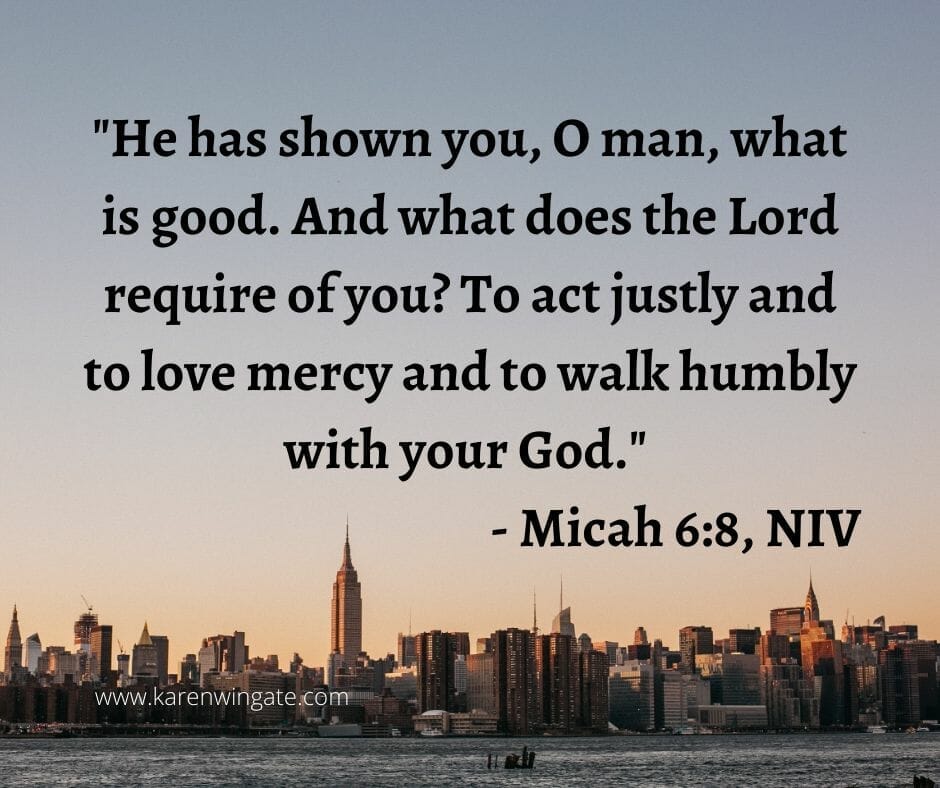
Some social justice issues are too big to solve. Especially by one person.
When we hear about big social justice issues, it’s easy to wring our hands, wonder what we can do, and then fold our hands and do nothing.
After all, how can one person possibly solve:
- Abortion
- Human trafficking
- Coronavirus
- Mass shootings
- Racial violence
- Illegal immigration.
- Illiteracy
- Urban decay
We’re called to care for the oppressed and seek justice.
But there aren’t enough hours in the day and lives to be lived to be a champion for all the societal issues that plague the world. So, what do I do? How do I respond to evil and injustice?
Several years ago, a Facebook friend tried to incite me to take an active stand against racial injustice and violence. It was during the time of the Occupy Wall Street Movement. Um, nice idea, but, my friend. I have a problem. I live in a rural, Midwest town. I’m one person. I don’t even know someone of a different ethnic background at this moment. Is it really my responsibility to solve the problem of racial violence two thousand miles away? And others are tugging at me to be involved with more social ills – human trafficking, the right to life, gun control, hungry school children. . . .
My response to his pressure was this:
“The best I can to do is to be a change agent in my corner of the world. My goal is to model the love and grace of Christ in my own community and help the individuals God brings into my life.”
Karen Wingate
My “friend” did not like my answer.
I guess he thought I should board a bus, hand painted sign under my arm, and march down Wall Street.
I still stand by what I said. Promoting social justice by demonstrations and marches doesn’t bring a reversal in attitude. It usually accomplishes nothing more than polarizing more people. But should I do nothing? Does the fact that I’m not carrying a sign down Wall Street or blasting my personal opinion on Twitter mean I’m not concerned or actively involved in social justice matters?
Stories of three men give me ideas of how I can be an effective change agent that will slow the momentum of evil. Let me tell about them.
Sir Nicholas George Winton
Nicholas Winton, a British humanitarian of German/Jewish descent, helped 669 Jewish children flee Czechoslovakia before Hitler entered Prague on September 1, 1939. He arranged for their passage to Britain and found homes for all of them. A humble man, he didn’t talk easily about his accomplishment, but went on to establish homes for the mentally ill and elderly. His work was recognized over 50 years later by the British BBC program, “That’s Life,” where over two dozen of the now grown children applauded his efforts.
You can watch a video about Nicholas Winton here.
Nicholas Winton didn’t stop the Holocaust. But he did save the lives of 669 children. And if you count the children and grandchildren of those children, 15,000 people are in the world today because one man brought them to safe haven.
Janusz Korczak
Mr. Korczak was a famous Polish educator, known affectionately as Pan Doktor or “Old Doctor,” Poland’s version of Mr. Fred Rogers. He even had a radio program during the 1930’s where he advocated for the rights of children.
He spent many years as director of an orphanage in Warsaw and, as the Nazis began to edge closer to Poland, refused sanctuary repeatedly so he could stay with the children. Finally, it was too late. The time came when the entire institution was sent first to a ghetto and on to the Treblinka extermination camp. Even on the day the children were taken from the Ghetto, Korczak refused a final offer of sanctuary.
The best part of this story is not that he went with the children, but how he went. The Wikipedia article about Janusz Korczak tells how he had the children dress in their best clothes and made sure each had a blue knapsack and a book or toy to carry. He told the children they were going out to the country, away from the suffocating walls of the city so they should go cheerfully. He boarded the train with them and was never seen again.
Janusz Korczak couldn’t save the children. But he could model strength and courage in the face of death.
Liviu Librescu
This is the story that touches me most deeply. Liviu Librescu, 76, served as a professor of engineering at Virginia Tech University when a gunman entered VATech’s Norris Hall and methodically went from classroom to classroom, taking out students and faculty. Librescu blocked the door of the classroom with his body, allowing students time to escape through the window while the gunman fired multiple shots through the door. Librescu’s efforts saved 22 lives, many who say they owe their lives to his bravery.
Evil was no stranger to Librescu. Born in 1930, he spent part of the Nazi occupation of Romania in a labor camp and later, in a ghetto in the city of Foscani. After the war, he received degrees in engineering and mechanics and came to Virginia Tech in 1988, publishing many articles in the field of engineering science.
I like what Dennis Miller said on the Fox New O’Reilly factor on April 18, 2007:
“I think Librescu, a 76-year-old Holocaust survivor who, if you do the math, was probably 12 when he first saw the face of evil, I’m sure looked up at that narrow window and that door and saw the same sick glint, that dead shark thing in that eye that he had seen as a young man. And he went towards it to stop it.”
Dennis Miller
Liviu Librescu gave his life so others could be saved. He set the standard on how to deal with evil: Face it, walk toward it, stall it, so others can get away, even if it means sacrificing your life to do so. That’s how you stop violence.
How do we bring justice?
I can’t mandate gun control. A march in a racial violence protest won’t really solve anything. But I can stand up for what is right and good. I can teach children to love rather than to hate. And may God help me have the courage to walk toward evil if I see it to thwart it and perhaps save one or more lives.
We demonstrate justice and offer mercy to those victimized by injustice. We combat unfairness by being fair, balancing the scales and offering mercy to the oppressed.
Micah 6:8 says:
“He has shown you, O man, what is good. And what does the Lord require of you? To act justly, and to love mercy, and to walk humbly with your God.”
Micah 6:8, NIV

If we want to see our society return to a sense of justice, bring about fairness in the world, and offer mercy to those who get the short end of the stick, it starts with us. We treat those in our corner of the world with God’s mercy and forgiveness in the small ways, showing that not all the world is unfair or cruel. We choose to parade grace. And then, when those around us observe what undeserved loving-kindness looks like, they can then choose to walk toward it and follow the Giver of Grace.
Will you join me?

Leave a Reply